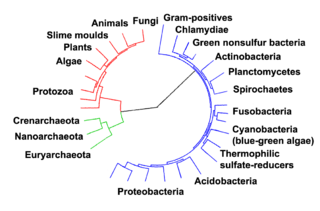Related Research Articles
The Thermomicrobia is a group of thermophilic green non-sulfur bacteria. Based on species Thermomicrobium roseum and Sphaerobacter thermophilus, this bacteria class has the following description:

Enterobacter is a genus of common Gram-negative, facultatively anaerobic, rod-shaped, non-spore-forming bacteria of the family Enterobacteriaceae. It is the type genus of the order Enterobacterales. Several strains of these bacteria are pathogenic and cause opportunistic infections in immunocompromised hosts and in those who are on mechanical ventilation. The urinary and respiratory tracts are the most common sites of infection. The genus Enterobacter is a member of the coliform group of bacteria. It does not belong to the fecal coliforms group of bacteria, unlike Escherichia coli, because it is incapable of growth at 44.5 °C in the presence of bile salts. Some of them showed quorum sensing properties as reported before.

Selenops is a spider genus that is found in many deserts of the world. It is very hard to distinguish the 115 species.

Storckiella is a genus of four recognised species of trees, of the legume plant family, Fabaceae. They grow naturally in New Caledonia, Fiji and Australia.

Actinobacillus is a genus of Gram-negative, nonmotile and non-spore-forming, oval to rod-shaped bacteria occurring as parasites or pathogens in mammals, birds, and reptiles. It is a member of the Pasteurellaceae family. The bacteria are facultatively anaerobic or aerobic, capable of fermenting carbohydrates, and of reducing nitrates. The genomic DNA contains between 40 and 47 mol % guanine plus cytosine.
The Chloroflexi or Chlorobacteria are a phylum of bacteria containing isolates with a diversity of phenotypes, including members that are aerobic thermophiles, which use oxygen and grow well in high temperatures; anoxygenic phototrophs, which use light for photosynthesis ; and anaerobic halorespirers, which uses halogenated organics as electron acceptors.

The bacterial phyla are the major lineages, known as phyla or divisions, of the domain Bacteria.
Armatimonadetes is a phylum of gram-negative bacteria.
Propionivibrio limicola is a gram negative, oxidase- and catalase-negative anaerobic, fermentative, non-spore-forming, mesophilic, rod-shaped, motile bacterium from the genus of Propionivibrio which has the ability to degrade hydroaromatic compounds.
Quadricoccus australiensis is a gram-negative, oxidase-negative, catalase-positive, aerobic, non-motile bacterium from the genus of Quadricoccus which was isolated from activated sludge biomass sample in Australia.
Aeromonas australiensis is a Gram-negative, anaerobic bacterium from the genus Aeromonas isolated from an irrigation water system in Western Australia.
Psychrobacter marincola is a Gram-negative, psychrophilic, moderately halophilic, aerobic oxidase- and catalase-positive, non-pigmented non-spore-forming, nonmotile bacterium of the genus Psychrobacter, which was isolated from the Indian Ocean.
"Procabacteriaceae" is a Candidatus family of uncultivated Gram-negative Betaproteobacteria. The sole genus, "Procabacter", was identified as an obligate endosymbiont of Acanthamoeba.
Hansschlegelia plantiphila is a Gram-negative, aerobic and non-motile bacterium species from the genus of Hansschlegelia. Hansschlegelia plantiphila can utilize methanol.
Runella is a Gram-negative, aerobic and non-motile bacterial genus from the family of Cytophagaceae.
Polaribacter is a Gram-negative, heterotrophic, psychrophilic or mesophilic and aerobic bacteria genus from the family of Flavobacteriaceae.
Mahella is a genus in the phylum Firmicutes (Bacteria). The name Mahella derives from: New Latin feminine gender dim. noun Mahella, named in honour of the American microbiologist Professor R.A. Mah, for his important contribution to the taxonomy of anaerobes.
Tetrasphaera australiensis is a Gram-positive bacterium species from the genus of Tetrasphaera which has been isolated from activated sludge from Glenelg in Australia.
Aliiroseovarius pelagivivens is a Gram-negative, aerobic and non-motile bacterium from the genus of Aliiroseovarius which has been isolated from seawater from the Geoje Island in Korea.
Celeribacter halophilus is a Gram-negative and non-motile bacterium from the genus of Celeribacter which has been isolated from seawater from the coastal region of Qingdao in China.
References
- ↑ LSPN lpsn.dsmz.de
- ↑ International Journal of Systematic and Evolutionary Microbiology
- ↑ UniProt
- ↑ Maszenan, AM; Seviour, RJ; Patel, BK; Schumann, P (2002). "Quadricoccus australiensis gen. nov., sp. nov., a beta-proteobacterium from activated sludge biomass". Int J Syst Evol Microbiol. 52: 223–8. doi: 10.1099/00207713-52-1-223 . PMID 11858148.
| This Betaproteobacteria-related article is a stub. You can help Wikipedia by expanding it. |